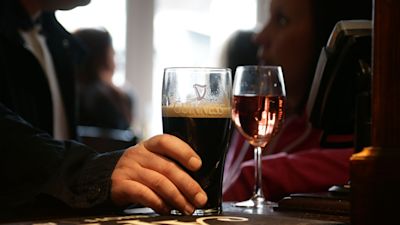No lock-ins under lockdown: Why are governments calling time on alcohol to combat Covid-19?

By ITV News Multimedia Producer Kate Mead
Pubs and bars may be able to reopen in most of the UK from Wednesday, but restrictions will still remain on how much customers are able to drink at their favourite local.
Wales has banned the sale of alcohol in pubs, bars and restaurants from Friday in an attempt to curb coronavirus in the lead up to Christmas.
Meanwhile in Scotland, alcoholic drinks under some of the tiers can only be served outside.
And in England, punters in Tier 2 will be able to order a glass of wine or pint of beer, but only with a meal - or a scotch egg if necessary. But another round is forbidden once food is finished.
So why is alcohol being restricted in the fight against Covid-19? Here's the reasoning behind it:
Is it because people under the influence are too friendly to socially distance?
Maybe. But that is not the real reason alcohol is being restricted.
Earlier in the year, the World Health Organization recommended a restriction on alcohol during lockdown.
It said that alcohol can increase the risk of injury and violence, including domestic violence and can cause alcohol poisoning.
The WHO also said that alcohol can exacerbate health vulnerability and mental health issues.
Carina Ferreira-Borges of the Alcohol and Illicit Drugs Programme at WHO/Europe said that she would like to see a ban of alcohol in our own homes as well as restrictions in pubs.
"Alcohol is consumed in excessive quantities in the European Region, and leaves too many victims," she said.
"During the Covid-19 pandemic, we should really ask ourselves what risks we are taking in leaving people under lockdown in their homes with a substance that is harmful both in terms of their health and the effects of their behaviour on others, including violence."
Can restricting alcohol protect the NHS?
Of course! In normal times alcohol-related injuries and illnesses are the most common admissions in UK hospitals.
Early this year, hospital admissions as a result of alcohol increased by 6.4% which was described as a "public health emergency".
Last year, research found that one in five people admitted to a UK hospital drinks to a harmful level while one in 10 is alcohol dependent.
The estimated annual cost to the NHS of alcohol-related conditions is a staggering £3.5 billion.
So, it is easy to see the reasoning behind saying last orders during a pandemic.
So have people been drinking less in 2020?
It's hard to say.
Research this year found that an estimated 8.6 million people in the UK were drinking more than usual in the spring lockdown. But an estimated 14 million cut down on alcohol consumption or stopped altogether.
It may not be the same story for the winter restrictions in the UK. In Northern Ireland, a survey found binge-drinking increased in the over-50s in lockdown.
And studies in other parts of the UK have found that drinking has doubled as people try to cope with the lockdown.
Would a complete prohibition be better?
Not necessarily.
South Africa, Thailand and India rolled out alcohol bans during the crisis. The idea was to free up hospital beds for Covid patients and reduce admissions.
However, South Africa and India have fared particularly badly in the number of infections and it is hard to tell whether alcohol has had a direct affect on cases.
Other countries have cracked down on alcohol use during the pandemic.
Kenya banned alcohol sales in restaurants.
And in Spain, fines were introduced in Catalonia of up to £13,500 for anyone caught drinking alcohol in the streets, after a spike in coronavirus cases.
What have UK leaders said about restrictions on alcohol during the pandemic?
First Minister Mark Drakeford acknowledged that the restrictions being imposed on Wales' hospitality industry would be "difficult".
He said: "The measures we are taking are based on what the UK Sage [the government's Scientific Advisory Group on Emergencies] group of experts tells us has worked best elsewhere."
However, the Tory leader in Wales, Paul Davies said: "With the best will in the world, and especially in the run-up to Christmas, if pubs and cafes cannot sell alcohol with meals, it could encourage people to drink at home and in groups.
"All the evidence so far has shown that these sorts of interactions are generally more likely to be a cause of transmission."
Prime Minister Boris Johnson said that he knew restrictions will bring "a great deal of heartache and frustration, especially for our vital hospitality sector".
But he warned: "If we ease off now we risk losing control over this virus all over again, casting aside our hard-won gains and forcing us back into a new year national lockdown with all the damage that would mean."
Last month, Speaker Sir Lindsay Hoyle banned alcohol from being served in the House of Commons as restrictions in London increased.